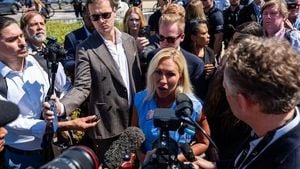On August 22, 2025, the political landscapes of both the United States and South Sudan were rocked by dramatic developments, each with far-reaching consequences for governance, public safety, and stability. In Washington, D.C., President Donald Trump stood before a formidable assembly of law enforcement officers, National Guard troops, and federal agents at a U.S. Park Police operations center, vowing to clamp down on what he described as an out-of-control crime wave. Meanwhile, thousands of miles away in Juba, South Sudan’s President Salva Kiir dismissed his finance minister for the seventh time since 2020, a move emblematic of the economic and political volatility gripping the world’s youngest nation.
President Trump’s appearance in one of Washington’s toughest neighborhoods was anything but routine. According to Associated Press, the Republican leader praised the deployment of roughly 2,000 National Guard troops—loaned by governors from at least six Republican-led states—to tackle crime in the nation’s capital. "We’re not playing games," Trump declared, his message echoing across the operations center. "We’re going to make it safe. And we’re going to then go on to other places." The White House, seizing on the moment, livestreamed Trump’s remarks, underscoring the administration’s belief that this aggressive approach to public safety would resonate with voters.
The White House’s strategy has been to showcase these efforts as a model of effective crime-fighting. Each morning, Trump’s press office circulates statistics detailing the previous night’s law enforcement actions, including the number of arrests and how many involved individuals in the country illegally. Vice President JD Vance and Defense Secretary Pete Hegseth even made a surprise visit to Union Station on August 20 to thank National Guard members, sharing burgers from Shake Shack—a gesture designed to highlight the administration’s support for those on the front lines.
Yet, the president’s decision to dispatch troops to Washington has met fierce resistance from Democrats, who view it as a dangerous overreach of federal power and a political stunt. Maryland Governor Wes Moore, himself an Army veteran, minced no words in his criticism. "I’m deeply offended, as someone who’s actually worn the uniform, that he would use the lives of these men and women and the activation of these men and women as political pawns," Moore told Associated Press. He further argued that Trump’s actions were a distraction from persistent problems like inflation, rising energy prices, and healthcare cuts. Moore was adamant that he would block any attempt to send the National Guard into Baltimore, stating, "I have not seen anything or any conditions on the ground that I think would justify the mobilization of our National Guard."
Other Democratic leaders have joined the chorus of criticism. Cleveland Mayor Justin Bibb, who leads the Democratic Mayors Association, pointed out that over half of the largest Democratic-led cities have seen violent crime decrease this year. "He’s stoking racial division and stoking fear and chaos," Bibb said, adding, "We need someone who wants to be a collaborator, not a dictator." Democratic strategists, while acknowledging that Republicans have held the upper hand on crime and immigration issues, believe this moment could allow them to go on the offensive. "This is an opportunity for the party to go on offense on an issue that has plagued us for a long time," said veteran strategist Daniel Wessel. "The facts are on our side."
Indeed, the facts present a nuanced picture. FBI statistics released in August 2025 show that murder and nonnegligent manslaughter in the United States fell nearly 15 percent in 2024 compared to the previous year, continuing a downward trend since the pandemic-era spike. Nevertheless, public opinion remains divided. A CNN/SSRS poll in May found that about four in ten U.S. adults align more closely with the Republican Party’s views on crime and policing, while three in ten side with Democrats. Another three in ten say neither party reflects their opinions. Trump himself remains confident, telling The Todd Starnes Show, "Because I sent in people to stop crime, they said, ‘He’s a dictator.’ The real people, though, even Democrats, are calling me and saying, ‘It’s unbelievable’ how much it has helped."
Yet, the increased military presence has injected anxiety into daily life for many D.C. residents. At least one daycare center closed on August 21, citing fears related to the military deployment and heightened immigration enforcement. Local officials have also raised concerns about the impact on upcoming public school openings. The sense of unease is compounded by a rising apprehension about the expansion of presidential power. An AP-NORC poll from April 2025 found that about half of U.S. adults now believe the president wields "too much" power—a sharp increase from just over a third in March 2024.
While Washington grapples with questions of federal authority and public safety, South Sudan is facing its own crisis of governance. On August 22, President Salva Kiir dismissed Finance Minister Marial Dongrin Ater, the seventh such replacement since 2020, according to Reuters. No official reason was given for Ater’s removal, but the move comes amid persistent economic turmoil and political instability. Athian Ding Athian, who previously held the finance portfolio between 2020 and 2021, was reappointed to the post. Kiir also fired the minister in charge of investment on the same day.
South Sudan’s economic woes are profound. The International Monetary Fund forecasts a 4.3 percent contraction of the economy in 2025, with inflation expected to soar to 65.7 percent. The country’s financial troubles have been exacerbated by communal violence, a sharp decline in crude oil revenue since the 2013-2018 civil war, and export disruptions caused by ongoing conflict in neighboring Sudan. These challenges have left the government struggling to provide basic services and maintain stability.
The political situation in South Sudan remains precarious. In March 2025, First Vice President Riek Machar was placed under house arrest, sparking fears of renewed conflict. Information Minister Michael Makuei accused Machar of agitating his supporters to rebel in an effort to disrupt peace and prevent elections, a charge that Machar’s party has denied. President Kiir, who has led South Sudan since its independence in 2011, continues to navigate a treacherous political landscape marked by factional rivalries and intermittent violence.
Both Washington and Juba are now at pivotal moments. In the U.S., questions about the appropriate use of federal power and the balance between security and civil liberties are front and center. In South Sudan, the relentless churn of top officials and dire economic forecasts underscore the fragility of the nation’s young institutions. For citizens in both capitals, the stakes could hardly be higher as leaders make choices that will shape their futures for years to come.
As the dust settles from these latest political maneuvers, the world watches closely, aware that the outcomes in Washington and Juba may reverberate far beyond their borders.



